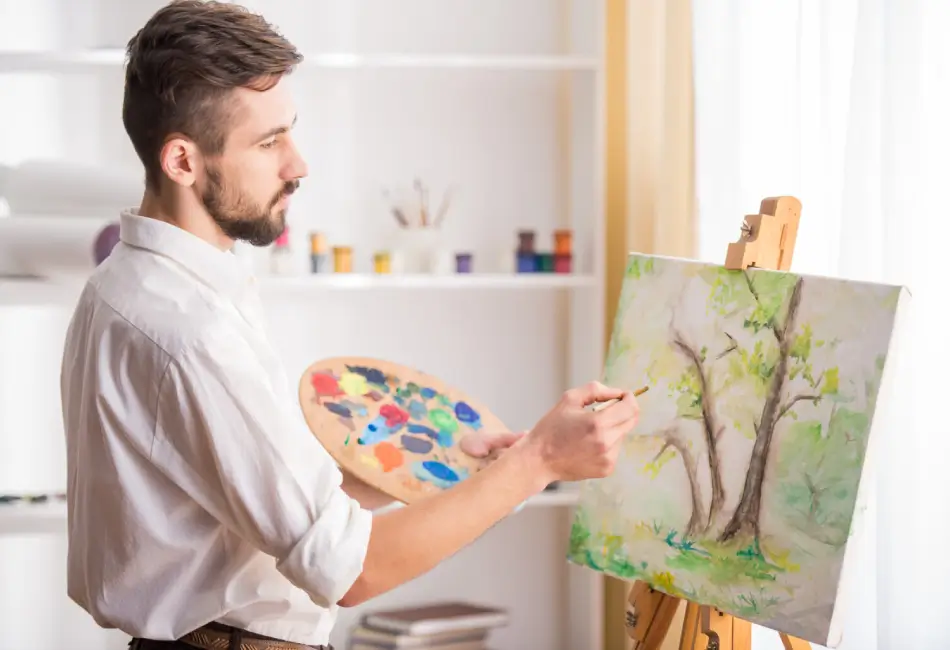Art Therapy for Drug & Alcohol Addiction Recovery
Discover the power of art therapy for substance abuse recovery, blending creativity with healing to offer a path towards recovery with Black Horse Health.
From psychiatric care to holistic wellness, our Houston-based team brings together diverse expertise to provide accurate, compassionate, and personalized mental health, chronic pain, and addiction treatment.
Experience a Whole-Person Healing With Black Horse Recovery
At Black Horse Health, we know that each person has their own unique story – no two people share the same needs, goals, and experiences when it comes to their mental health and addiction recovery journey.
Our knowledgeable and compassionate team of experts is committed to meeting each client where they’re at in their journey toward wellness. To provide excellent outcomes, we provide personalized, whole-person, integrative care that resonates with the individual.
One such treatment opportunity is art therapy. This treatment approach helps individuals to express themselves and create mind-body connections.
Read on to learn more about art therapy can help you or your loved one lay the foundation for sustainable wellness and don’t hesitate to reach out to our Black Horse Health team today for the support you deserve.

What is Art Therapy?
How Does Art Therapy Contribute to Substance Abuse Recovery?
Coping and Stress Reduction
Art therapy can introduce individuals to positive outlets for coping with difficult emotions. It can also help people with substance use disorder avoid using drugs or alcohol as a way to cope.2
Group Cohesion
Forms of Art Therapy for Substance Abuse
- Drawing and painting
- Sculpture and claywork
- Collage
- Dance/movement therapy
- Drama therapy
- Music therapy
- Writing or poetry therapy
Processing Emotions in Recovery With Art Therapy
The Role of Art Therapy in Developing Coping Skills
Art therapy for addiction recovery helps people find ways to handle cravings and risk factors for relapse. Immersing in the creative process serves as a temporary escape from overwhelming urges.
In recovery, making art lets people express their emotions. Art therapy can also help individuals work through the root causes of traumatic incidents or other underlying symptoms of their substance use disorder.
Reinforcing Positive Identity and Building Self-Efficacy
Who Might Benefit the Most From Art Therapy for Substance Abuse?
Who Else Benefits From Art Therapy?
How Art Therapy Can Complement Traditional Therapies
Enhanced Self-Awareness
Skill Building and Practice
Integrative Approach
What Art Forms Are Effective in Addressing Addiction-Related Issues?
Drawing and Painting
Sculpture and Claywork
Collage
Journaling or Poetry
- Organize thoughts
- Understand patterns
- Set intentions for the recovery journey
Music and Dance
How Art Therapists Assess Progress in Substance Abuse Treatment
How Else Can Progress Be Assessed in Art Therapy for Substance Abuse?
Exploring Underlying Trauma With Art Therapy for Substance Abuse
Art therapy can also help address the connection between trauma and drug use. Many people with addiction problems have faced trauma or emotional issues. They might use drugs to cope with or to avoid these feelings.
- Safe Expression: Traumatic experiences can be difficult to verbalize. In recovery, using art helps people express their traumatic memories and feelings without words.
- Symbolism and Metaphor: Through symbols, individuals can express traumatic events or feelings in a gentler way. This method makes it easier to deal with trauma without reliving the pain too much.
- Regaining Control: Trauma often results in feelings of powerlessness. The act of creating art lets individuals exercise control over their narrative. This allows them to reshape and reinterpret traumatic events, fostering a sense of empowerment.
- Building Therapeutic Trust: For those unsure about regular talk therapy, art allows them to slowly build trust with the therapist.
- Integration and Reconciliation: Art therapy for substance abuse helps people reintegrate traumatic experiences into their life story. By showing both difficult times and positive moments through art, they can start making peace with their past.
- Reconstruction of Identity: Substance use disorder and trauma can lead to a fragmented sense of self. Art therapy offers a platform for individuals to visualize and reconstruct a positive identity.
Art Therapy for Substance Abuse Recovery: Potential Challenges
Other Potential Challenges of Art Therapy for Substance Abuse Recovery

Find Art Therapy for Substance Abuse with Black Horse Health
Our art therapy for substance abuse treatment program blends creativity with therapeutic intervention. By offering this unique form of self-expression, we aim to address the intricate emotional layers of addiction.
How Can We Help?
Our compassionate team will meet with you to understand your symptoms and help develop a treatment plan that best suits your needs. We may incorporate art therapy into your plan, but we also offer other holistic therapies such as yoga, equine therapy, and drama therapy.
Reach Out to Us Today
Let Black Horse Health provide hope, healing, and a splash of color to the tapestry of recovery. Get in touch with us today for comprehensive healing.
Resources
- https://www.psychology.org/resources/what-is-art-therapy/
- https://www.ncbi.nlm.nih.gov/pmc/articles/PMC5836011/
- https://www.ncbi.nlm.nih.gov/pmc/articles/PMC10343444/
- https://www.ncbi.nlm.nih.gov/pmc/articles/PMC1071468/
- https://psychcentral.com/ptsd/art-therapy-for-trauma
- https://www.verywellmind.com/dance-therapy-and-eating-disorder-treatment-5094952
- https://www.sciencedirect.com/science/article/abs/pii/S0197455611000207
- https://istss.org/ISTSS_Main/media/Documents/ISTSS_TraumaStressandSubstanceAbuseProb_English_FNL.pdf


